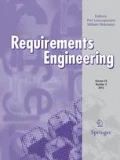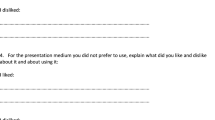Abstract
Accurate understanding of software requirements by end users and software developers is important to ensure a high quality software product. While comprehension performance on systems analysis tools has been studied in the past, there is little research that examined the influence of personality type of an individual on his/her performance. This paper has two objectives. First, the research uncovers the relationships between personality types (introvert/extrovert, sensing/intuitive, feeling/thinking, and perceptive/judging) and comprehension performance (accuracy and speed) of users/developers using the structured tools: Decision Tables (DT), Nassi–Schneiderman Charts (NS) and Structured English (SE). Second, it examines the trade-offs between comprehension accuracy and speed for each personality type. Using laboratory experiments, we measured individual performance with the three structured tools. We found that introverts and feeling personalities comprehended more accurately with DT; thinking and intuitive personalities comprehended more accurately with NS and SE. The comprehension accuracy increased with time more for SE than for DT and NS. The results show the most suitable combinations of structured tools and personality types for high comprehension. The results also provide guidelines to managers with tight project schedules, such as structured tools that are easier/faster to understand and the matching personalities who can comprehend faster.





Similar content being viewed by others
References
Burton-Jones A, Meso PN (2006) Conceptualizing systems for understanding: an empirical test of decomposition principles in object-oriented analysis. Inform Syst Res 17(1):38–60
Capretz LF (2003) Personality types in software engineering. Int J Hum Comput Stud 58(2):207–214
Chilton MA, Hardgrave BC, Armstrong DJ (2005) Person-job cognitive style fit for software developers: the effect on strain and performance. J Manage Inform Syst 22(2):193–226
Cornelissen B, Zaidman A, van Zaidman A, van Deursen A, Moonen L, Koschke R (2009) A systematic survey of program comprehension through dynamic analysis. IEEE Trans Softw Eng 35(5):684–702
Davies I, Green P, Rosemann M, Indulska M, Gallo S (2005) How do practitioners use conceptual modeling in practice? Data Knowl Eng 58(3):358–380
Gorla N, Lam YW (2004) Who should work with whom? Building effective software project teams. Commun ACM 47(6):79–82
Gorla N, Pu H-C, Rom WO (1995) Evaluation of process tools in systems analysis. Inf Softw Technol 37(2):119–126
Hungerford BC, Hevner AR, Collins RW (2004) Reviewing software diagrams: a cognitive study. IEEE Trans Softw Eng 30(2):82–96
Huysmans J, Dejaeger K, Mues C, Vanthienen J, Baesens B (2011) An empirical evaluation of the comprehensibility of decision table, tree and rule based predictive models. Decis Support Syst 51:141–154
Keirsey D, Bates M (1984) Please understand me: character and temperament types. Gnosology Books, Prometheus Nemesis. Del Mar
Khatri V, Ram S, Snodgrass RT (2004) Augmenting a conceptual model with geospatiotemporal annotations. IEEE Trans Knowl Data Eng 16(11):1324–1338
Lohse GL, Biolsi K, Walker N, Rueter HH (1994) A Classification of visual representations. Commun ACM 37(12):36–49
McDonald S, Edwards HM (2007) Who should test whom? Commun ACM 50(1):67–71
McElroy J, Hendrickson AR, Townsend AM, DeMarie SM (2007) Dispositional factors in internet use: personality versus cognitive style. MIS Q 31(4):809–820
Miller J, Yin Z (2004) A cognitive-based mechanism for constructing software inspection teams. IEEE Trans Softw Eng 30(11):811–825
Myers IB, McCaully MH (1985) Manual: a guide to the development and use of Myers-Briggs type indicator. Consulting Psychologists Press, Palo Alto
Santos-Gomez L, Darnell M (1992) Empirical evaluation of decision tables for constructing and comprehending expert systems. Knowl Acquis 4(4):427–444
Scanlan DA (1989) Structured flowcharts outperform pseudocode: an experimental comparison. IEEE Software: 28–36
Shaft TM, Vessey I (2006) The role of cognitive fit in the relationship between software comprehension and modification. MIS Q 30(1):29–55
Sinha AP, Vessey I (1992) Cognitive fit: an empirical study of recursion and iteration. IEEE Trans Softw Eng 18(2):368–379
Vessey I, Weber R (1986) Structured tools and conditional logic: an empirical investigation. Commun ACM 29(1):48–57
Acknowledgments
We thank the anonymous reviewers for their highly valuable and clear comments, which have made the paper a better one.
Author information
Authors and Affiliations
Corresponding author
Rights and permissions
About this article
Cite this article
Gorla, N., Chiravuri, A. & Meso, P. Effect of personality type on structured tool comprehension performance. Requirements Eng 18, 281–292 (2013). https://doi.org/10.1007/s00766-012-0158-z
Received:
Accepted:
Published:
Issue Date:
DOI: https://doi.org/10.1007/s00766-012-0158-z






